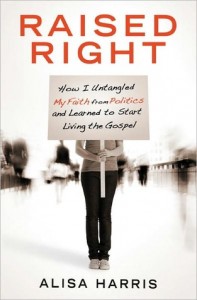 There was a time in my life – during the George W. Bush era – when I read a lot of books that were coming out critiquing the conservative evangelical movement that supposedly won Bush II the White House. Each of the books was more or less a variation of the same theme – Republicans are stupid and wrong; evangelicals are stupid, wrong and evil. Needless to say, I became a little cynical, with politics naturally and with the brand of evangelical Christianity that I’d see only glimpses of in my otherwise conservative Christian but mostly apolitical upbringing. After reading about a half dozen books of this variety, I started to realize I was becoming an angry person with a shorter fuse than normal and that my anger at the president for the war in Iraq was not healthy. That and I realized I didn’t want to embody the lunacy of the anti-Bush stickers and mean-spirited protests at rock concerts. I was no longer right-leaning by default that a fellow Methodist was running for president but I was hardly a lefty either.
There was a time in my life – during the George W. Bush era – when I read a lot of books that were coming out critiquing the conservative evangelical movement that supposedly won Bush II the White House. Each of the books was more or less a variation of the same theme – Republicans are stupid and wrong; evangelicals are stupid, wrong and evil. Needless to say, I became a little cynical, with politics naturally and with the brand of evangelical Christianity that I’d see only glimpses of in my otherwise conservative Christian but mostly apolitical upbringing. After reading about a half dozen books of this variety, I started to realize I was becoming an angry person with a shorter fuse than normal and that my anger at the president for the war in Iraq was not healthy. That and I realized I didn’t want to embody the lunacy of the anti-Bush stickers and mean-spirited protests at rock concerts. I was no longer right-leaning by default that a fellow Methodist was running for president but I was hardly a lefty either.
Raised Right: How I Untangled My Faith From Politics by Alisa Harris represented a return of sorts for me to the subject of Christianity and politics, but it’s written from a perspective I hadn’t actually read in any of the “the evangelicals are taking over and it’s the end of the world as we know it” tomes that had fueled my anger. If these books were a caricature of how evangelicals in the Midwest and South behaved, Harris’ memoir promised to paint a more accurate picture of what it was like to grow up in that environment. Like Jesus Camp without all of the annoying editorializing (and of course not much summer camp either, since the movie spends precious little time at an actual camp).
As a 20-something writer telling her relatively short story, Harris excels. In one of the more memorable anecdotes from the book, Harris recalls the zeal with which she dressed a goat up as Hillary Clinton in a 4-H Fair show, an example that speaks to the way in which political opinions instilled in young people can have unfortunately embarrassing consequences.
Where the book starts to drift is when she gets to the untangling of her faith from politics. This untangling, it turns out, led to a different kind of tangling with a different kind of politics – voting for Obama, turning up at Occupy rallies, fighting for more “liberal” causes and that sort of thing. It’s a natural progression for a young person to go through and one I experienced to a lesser extent myself, but one that speaks to the difficulty of the subject at hand. How does one actually untangle their faith from politics? Where is the balance? And is it really possible to be a centrist Christian?
Harris doesn’t really answer those questions or grapple with them much. Her conclusion seems to be that leaving her conservative activist upbringing and embracing a more liberal view of the world that jives more with the people in the big city where she lives is the answer. I don’t fault her for that necessarily; I just wish there was more in the book that spoke to the struggle to find balance in an increasingly divided country with a failed two-party political system.
Note: A complimentary copy of this book was received from WaterBrook Multnomah’s Blogging for Books program.
Leave a Reply